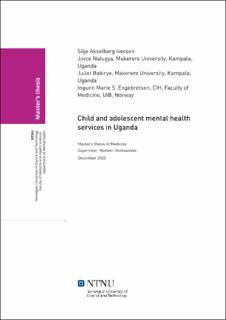| dc.contributor.advisor | Skokauskas, Norbert, Regional Knowledge Center for Children and Adolescents – Mental Health and Child Welfare, NTNU, IPH; FMH, Trondheim, Norway | |
| dc.contributor.author | Iversen, Silje Akselberg | |
| dc.contributor.author | | |
| dc.contributor.author | Nalugya, Joyce, Department of Psychiatry, Makerere University College of Health Sciences, Kampala, Uganda | |
| dc.contributor.author | | |
| dc.contributor.author | Babirye, Juliet, Makerere University School of Public Health, Kampala, Uganda | |
| dc.contributor.author | | |
| dc.contributor.author | Engebretsen, Ingunn Marie S., Center for International Health, Department of Global Health and Social Medicine, Faculty of Medicine, University of Bergen, Norway | |
| dc.contributor.author | | |
| dc.contributor.author | Skokauskas, Norbert, Regional Knowledge Center for Children and Adolescents – Mental Health and Child Welfare, NTNU, IPH; FMH, Trondheim, Norway | |
| dc.date.accessioned | 2021-09-13T16:16:58Z | |
| dc.date.available | 2021-09-13T16:16:58Z | |
| dc.date.issued | 2021 | |
| dc.identifier | no.ntnu:inspera:71800818:14534168 | |
| dc.identifier.uri | https://hdl.handle.net/11250/2775982 | |
| dc.description.abstract | Barn og ungdoms psykiske helsetjenester i Uganda
Introduksjon
Over hele verden lider 1 av 5 barn av psykisk sykdom, mens de står overfor begrensede muligheter for behandling og restitusjon. Mens de vokser opp, står de overfor flere utfordringer som kan bidra til utviklingen av psykiske lidelser. Uganda er et utviklingsland med en historie preget av langvarige borger- og regionale kriger med barnesoldater, stort antall flyktninger og internt fordrevne på grunn av naturkatastrofer og uro, og en stor smittsom sykdomsbyrde hovedsakelig på grunn av akutte luftveisinfeksjoner, malaria og HIV / AIDS. Alle disse faktorene kan påvirke den unge befolkningen i Uganda både fysisk og mentalt.
Formål
Dette er et litteratursøk av eksisterende studier om psykiske helsetjenester for barn og unge i Uganda.
Metodikk
En scoping review-tilnærming ble brukt til å velge studier om psykiske helsetjenester (CAMHS) i Uganda. Søk i MEDLINE-, Wiley- og PubMed-databasene ble utført ved bruk av kvalifiseringskriterier. Studiene ble oppsummert i tabeller og deretter syntetisert ved hjelp av rammene for helsesystemer designet av Verdens helseorganisasjon (WHO). Dette ble gjort i henhold til de foretrukne rapporteringselementene for systematisk gjennomgang og M-analyser Extension for Scoping Review (PRISMA-ScR) retningslinjer.
Resultater
Tolv studier ble identifisert; 5 av studiene brukte kvalitative metoder og fokuserte mest på de nåværende begrensningene og styrkene til CAMHS i Uganda, mens 6 kvantitative studier undersøkte effekten av nye intervensjoner. En studie brukte en blandet metode-tilnærming. Oppsummert skisserte studiene et behov for samarbeid med primærhelsesektoren og tradisjonelle healere for å sikre ytterligere menneskelige ressurser, samt behovet for å fokusere på grupper som foreldreløse, HIV / AIDS-berørte ungdommer, tidligere barnesoldater og flyktninger. De ble presentert i henhold til WHOs Frameworks for monitoring health systems performance.
Konklusjon
Det er relativt få studier utført på barn og unges mentale helsetjenester i Uganda, og de fleste av dem som eksisterer er en del av større studier som involverer flere land. I denne studien prøvde vi å inkludere de som er satt i Uganda, og bare en ser på flere land. De mentale helsetjenestene for barn og unge i Uganda krever forbedring og må fokusere spesielt på sårbare grupper som foreldreløse, HIV / AIDS-berørte ungdommer og tidligere barnesoldater. Det kan styrkes via samarbeid med andre sektorer, integrering i primærhelsetjenesten, reduksjon av stigma og styrket arbeidsstyrke. | |
| dc.description.abstract | Introduction
Worldwide, 1 in 5 children and adolescents suffer from mental health disorders, while facing limited opportunities for treatment and recovery. Growing up, they face multiple challenges that might contribute to the development of mental disorders. Uganda is a developing country with a history of prolonged civil and regional wars associated with child soldiers, large numbers of refugees and internally displaced people due to natural disasters and unrest, and a large infectious disease burden mainly due to acute respiratory tract infections, malaria and HIV/AIDS. All of these factors may affect the young population of Uganda both physically and mentally.
Objective
This is a review of existing studies on child and adolescent mental health services in Uganda.
Methodology
A scoping review approach was used to select studies on child and adolescent mental health services (CAMHS) in Uganda. A search of MEDLINE, Wiley and PubMed databases was conducted using eligibility criteria. The papers were summarized in tables and then synthesized using the frameworks for health care systems designed by the World Health Organization (WHO). This was done according to the Preferred Reporting Items for Systematic Review and M-Analyses Extension for Scoping Review (PRISMA-ScR) guidelines.
Results
Twelve papers were identified; 5 of the studies used qualitative methods and focused mostly on the current limitations and strengths of CAMHS in Uganda, while 6 quantitative studies investigated the effects of new interventions. One study used a mixed-methods approach. In summary, the papers outlined a need for collaboration with the primary health sector and traditional healers to ensure additional human resources, as well as the need to focus on groups such as orphans, HIV/AIDS-affected youth, former child soldiers and refugees. They were presented according to the WHO Frameworks for monitoring health systems performance.
Conclusion
Relatively few studies have been conducted on CAMHS in Uganda, and most of those that exist are part of larger studies involving multiple countries. In this study, we tried to include those set in Uganda and only one looks at multiple countries. CAMHS in Uganda requires improvement and needs to focus especially on vulnerable groups such as orphans, HIV/AIDS-affected youth and former child soldiers. It could be strengthened via collaboration with other sectors, integration into primary health care, reduction of stigma and a strengthened workforce. | |
| dc.language | eng | |
| dc.publisher | NTNU | |
| dc.title | Child and adolescent mental health services in Uganda | |
| dc.type | Master thesis | |
